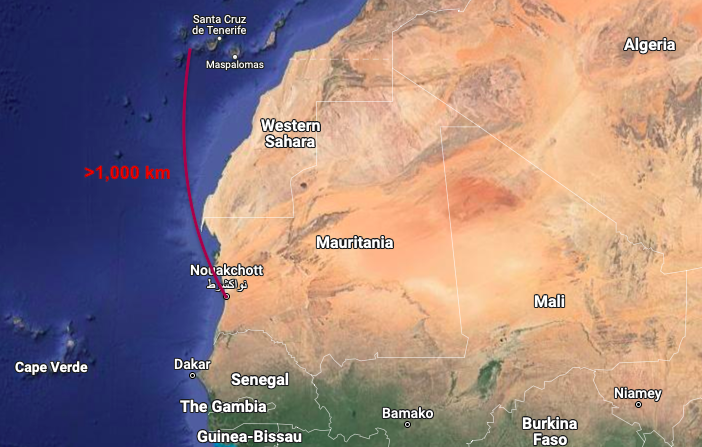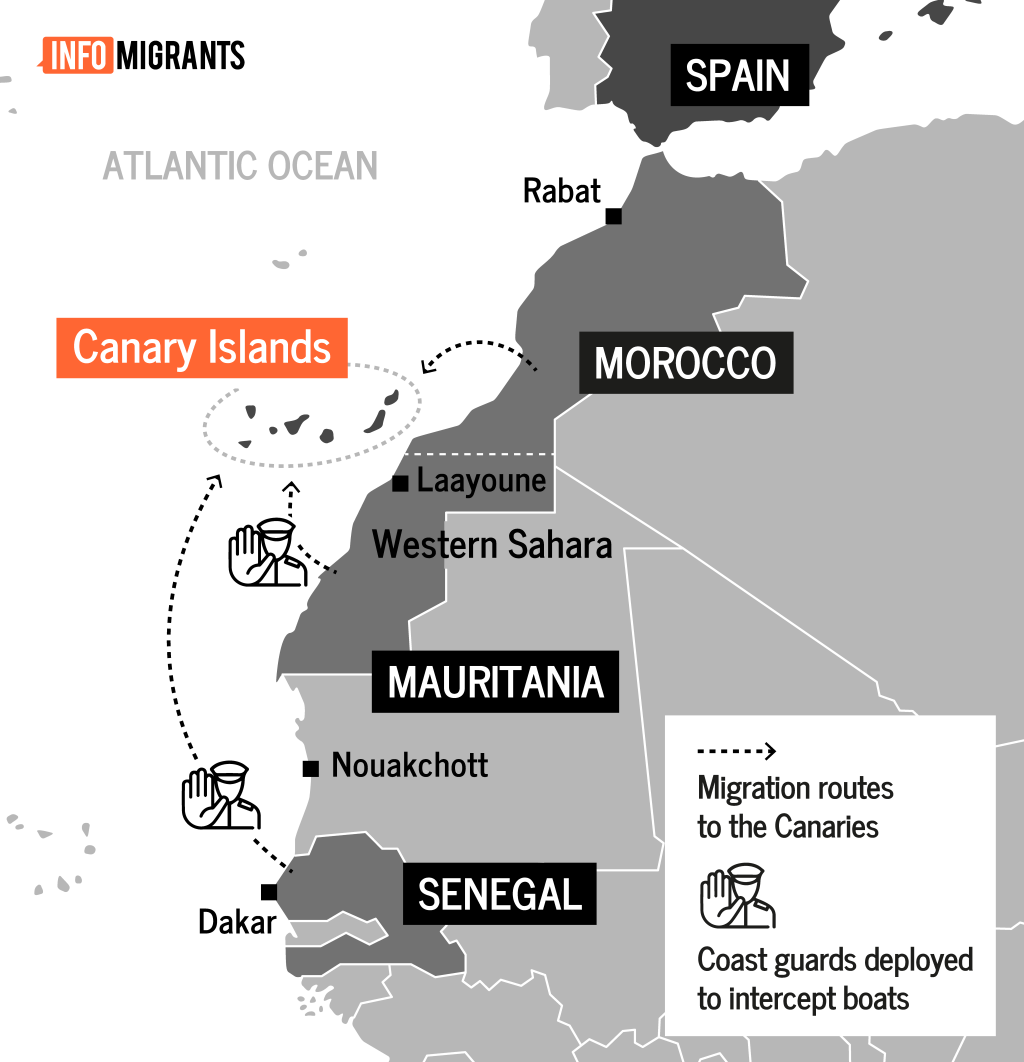Mauritanian police have reportedly arrested 125 Pakistani migrants who were trying to cross to Spain's Canary Islands. The northwestern African country has again become a crucial launchpad for migrants aiming for Europe.
On Wednesday (November 27), police in the Mauritanian capital Nouakchott arrested 125 migrants of Pakistani origin who were trying to cross to Spain's Canary Islands in a canoe-shaped boat, commonly known as a cayuco.
That's according to the Spanish news agency EFE citing a police report from Wednesday morning.
The arrests came during an operation to break up a smuggling network made up of three people of the same nationality.
According to EFE, the police said that the arrests were carried out on Sunday in Nouakchott and that the migrants are of Asian origin. EFE reported they are of Pakistani nationality, citing a "security source".
The detainees reportedly wanted to use a boat to reach the Canary Islands, located more than 1,000 kilometers north of Nouakchott. In the police operation, authorities seized 62 fuel cans holding 60 liters each as well as a boat engine, life jackets, sailor uniforms and other items.

Mauritania is a sovereign, predominantly Muslim country with a population of around five million people. Its territory, 90 percent of which is covered by the Sahara Desert, borders the disputed territory of Western Sahara, as well as Algeria, Mali and Senegal. It also has around 700 kilometers of Atlantic coastline.
Read AlsoSpain and Mauritania announce cooperation on migration
More arrests, uptick in departures from Mauritania
The arrests came a few days after Mauritanian authorities apprehended another 16 Pakistanis, EFE reported. The group had reportedly entered Mauritania illegally and is set to be repatriated to their country of origin.
Mauritanian police say that an investigation is underway to refer the case to the Mauritanian public prosecutor's office.
A number of factors may have led to Mauritania becoming a major irregular migration gateway to Europe, including developments in Senegal and the Gambia, increased crackdowns on migrants as well as enhanced border and maritime controls along the Mediterranean route and at the Spanish enclaves of Melilla and Ceuta.
However, Mauritania as an irregular migratory launchpad to the continent is nothing new. In 2014, for instance, the IOM recorded a surge in the number of migrants arriving in the Canary Islands from Mauritania. In 2018, meanwhile, migrants diverted through Mauritania due to intensified migrant crackdowns in Morocco.
In February, the European Union and Mauritania signed a 210 million euro (225 million dollar) deal aimed at deterring migrant boats and cracking down on people smuggling.
Read AlsoMigrants turn to Mauritania as new EU transit route
Record arrivals to Canaries
In recent years, the Canary Islands have emerged as the primary destination for undocumented migrants from the African continent entering Spain in search of a better life.
Atlantic crossings began rising in late 2019 after increased patrols along Europe's southern coast dramatically reduced Mediterranean crossings. In 2020, UN migration agency IOM registered just over 23,000 migrant arrivals in the Canary Islands. In 2021 it fell slightly to 22,000, and further to around in 2022, followed by a new record last year (39,910). This year, more than 40,000 migrants have arrived irregularly in the Canary Islands since the beginning of the year, the highest recorded number of such arrivals in history, according to figures from the Spanish interior ministry.

The previous record was recorded in 2006, when more than 32,000 migrants reached the islands.
The increase in arrivals goes hand in hand with a rise in deaths. According to the Missing Migrants Project, at least 690 migrants have died or gone missing so far this year (as of November 25) trying to reach the Canaries by boat, up from 537 last year and 43 in 2022. The real number is likely far higher. Spanish charity 'Caminando Fronteras' (Walking Borders) estimates that more than 5,000 migrants have died trying to reach Spain by sea in the first five months of this year alone.
According to UN refugee agency UNHCR, the most common nationalities of arrivals in the Canaries are currently Malians (36 percent), Senegal (19 percent), Morocco (9 percent) as well as Guinea and Mauritania (7 percent each). This presumably means that a significant share of migrants who arrive on the Canaries have traveled more than 1,000 kilometers.
At the beginning of the month, only ten of 58 migrants reportedly survived the crossing from northern Mauritania toward the Canaries. Their cayuco was found after three weeks by a merchant ship.
with EFE
